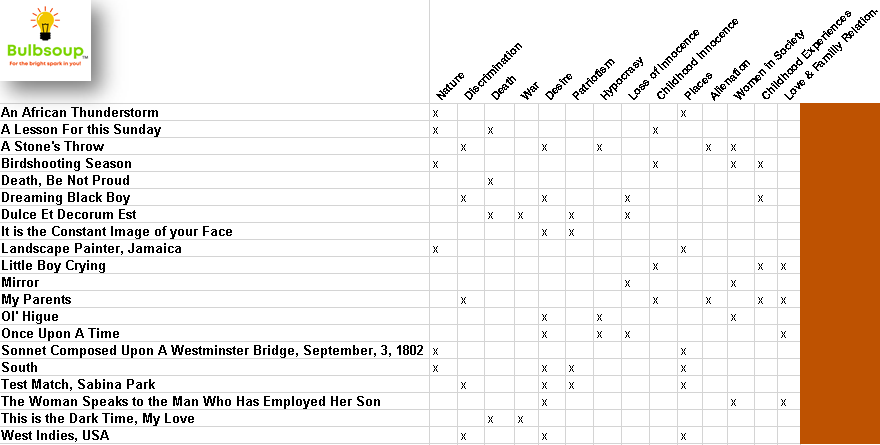Sentry Page Protection
mirror
|
|
Sylvia Plath (October 27, 1932 – February 11, 1963) was an American poet, novelist, and short story writer. She is credited with advancing the genre of confessional poetry and is best known for two of her published collections, The Colossus and Other Poems (1960) and Ariel (1965). (more)
|
LITERAL MEANING
A mirror defines itself. It reports that it reflects exactly what it sees. It is not cruel, just honest. It reflected a pink wall and shadows, until (www.bulbsoup.com) a lady started using it every morning. The more the lady looked in the mirror the older she became.
A mirror defines itself. It reports that it reflects exactly what it sees. It is not cruel, just honest. It reflected a pink wall and shadows, until (www.bulbsoup.com) a lady started using it every morning. The more the lady looked in the mirror the older she became.
|
4. I am silver and exact. I have no preconceptions.
Whatever I see I swallow immediately Just as it is, unmisted by love or dislike. I am not cruel, only truthful - 5 3. The eye of a little god, four-cornered. Most of the time I meditate on the opposite wall. It is pink, with speckles. I have looked at it so long I think it is part of my heart. But it flickers. Faces and darkness separate us over and over. 10 3. Now I am a lake. A woman bends over me. Searching my reaches for what she really is. 1. Then she turns to those liars, the candles or the moon. I see her back, and reflect it faithfully. I am important to her. She comes and goes. 20 5. Each morning it is her face that replaces the darkness. 6. In me she has drowned a young girl, 2. and in me an old woman rises toward her day after day, like a terrible fish. Poet: Sylvia Plath |
LITERARY DEVICES
1. PERSONIFICATION
|
3. METAPHOR
- Stanza 2, line 5: The mirror compares itself to a little god. The nature of a god is that it is all-seeing and all-knowing. Therefore, the mirror takes on this characteristic. What it reflects is truth because it sees and knows all.
- Stanza 3, line 10: The mirror compares itself to a lake. One can immerse themselves in a lake, become one with it when swimming, or drown themselves in it. This is what the woman does with the mirror, she immerses herself totally in it, using it as a tool to define herself.
IMPORTANT WORDS/ PHRASES
4.'I am silver and exact. I have no preconceptions' (Stanza 1, line 1)
The mirror defines itself as exact. It tells things as they are. The word preconception is defined as an opinion, or conception, formed beforehand. The mirror is devoid of this, it simply reflects what is.
5. 'Each morning it is her face that replaces the darkness.' (Stanza 3, line 20)
The woman is now dependent on the mirror to define and redefine herself daily. The time of the day, morning, implies that the minute she awakens, she consults the mirror.
6. 'In me she has drowned a young girl' (Stanza 3, line 21)
The lady consults the mirror so often (www.bulbsoup.com) that now she finds only faults. Therefore, she is becoming old. The implication is that she is not really old, just viewing herself as such because she sees every wrinkle and every line.
4.'I am silver and exact. I have no preconceptions' (Stanza 1, line 1)
The mirror defines itself as exact. It tells things as they are. The word preconception is defined as an opinion, or conception, formed beforehand. The mirror is devoid of this, it simply reflects what is.
5. 'Each morning it is her face that replaces the darkness.' (Stanza 3, line 20)
The woman is now dependent on the mirror to define and redefine herself daily. The time of the day, morning, implies that the minute she awakens, she consults the mirror.
6. 'In me she has drowned a young girl' (Stanza 3, line 21)
The lady consults the mirror so often (www.bulbsoup.com) that now she finds only faults. Therefore, she is becoming old. The implication is that she is not really old, just viewing herself as such because she sees every wrinkle and every line.
THEMATIC CATEGORY: Loss of Innocence, Women in Society
ATMOSPHERE
The mood of the poem is cold. The mirror relates facts without emotions.
The tone of the poem is robotic in nature. The persona is simply relating facts.
The mood of the poem is cold. The mirror relates facts without emotions.
The tone of the poem is robotic in nature. The persona is simply relating facts.
Contributor: Leisa Samuels-Thomas
Plath, S. 'Mirror' in A World of Poetry. Edited by Mark McWatt and Hazel Simmonds McDonald. Pearson Education Ltd, 2005.
Plath, S. 'Mirror' in A World of Poetry. Edited by Mark McWatt and Hazel Simmonds McDonald. Pearson Education Ltd, 2005.







